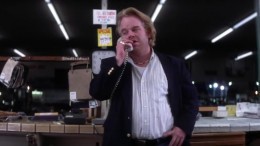Talking Dirty to Your Creditors

Well so here’s an interesting read I stumbled upon: a man — once a millionaire with a cocaine habit, now broke — gets tired of daily calls from Chase asking him for the $60,000 he owes them, which persist even as he tells the bank rep, Tammy, over and over that he doesn’t have the money. When logic doesn’t work, he tries something … different.
on the fourth day, at the same exact time, Tammy calls again. But this time I’m prepared. “Mr. Duff, this is Tammy from the Chase home equity loan department.”
“Mmmmm,” I groan.
“We need to know how you plan on paying off your debt.”
“Mmmm, yeah mmmm.” I slow the pace of my breathing. I make my way from the kitchen to the bathroom. I want my voice to echo. “Mmmmm.”
“Your financial hardship isn’t our problem. We need our money.”
“Say that again, say it again,” I murmur. “Mmmmmm.” I let out a few short breaths.
“Excuse me?”
“Hardship … say hardship,” I plead. “Hardship,” I whisper. “Mmmmm.”
Rude; crude, even. Yet remarkably effective. No one from Chase calls him again for a year.
I would probably be less unsettled by this if the gender dynamics were different, if the person turning the business transaction into a 1–900 call weren’t a man and the employee a woman. Man behaving in a creepy sexual way to a woman who is forced by the exigencies of her job to be on the phone with him — that sucks. It’s also a dynamic I recognize well from when I was a receptionist and forced to smile while men flirted with me. Duff acknowledges this point too, at the end, and apologizes to Tammy, wherever she is.
In a broader sense, though, Duff’s essay is about the point of desperation any of us can reach when we are dealing with automatons, or people we think of as automatons, because they represent corporate behemoths which are too big and too busy to have feelings.
At the same office where I was a receptionist, one of my coworkers got harassed by her creditors, who had found out her work number. They kept calling and hounding her for the cash she owed them. I’m not saying she was a responsible steward of money; she ordered food in once or twice every day and often went tripping off to Bloomingdales once we closed up shop with whatever credit cards hadn’t been cut up yet. But she was 24 and didn’t have the kind of cash they were looking for; and she certainly wasn’t able to speak rationally about it to people calling to bug her while she was trying to do her job. They didn’t suggest anything rational either; their advice was, “Open up another credit card and pay us with that.”
After a few months she just left, went back to Texas to live with her dad. Maybe it was to get distance from her creditors, or maybe it was to get distance from Bloomingdales and delis that will deliver you breakfast.
When people feel trapped, they will try anything to escape. Often they will lash out. In Duff’s case, he did something inappropriate; but because it was inappropriate, and shocking, it worked when nothing else had. I can’t say I approve, exactly, but I understand.
By the time someone from Chase called him again about his debt — a much older lady, a year later — Duff was able to respond in a more productive fashion. It also helps that he was sober at that point. He told the bank he had a total of $6,000 and offered to give them all of it. The bank accepted. If the initial bank rep had been trained or allowed to be more flexible, perhaps the two of them could have gotten to that successful resolution sooner, and all that innovative unpleasantness, which only offered a reprieve, anyway, and didn’t solve the problem, wouldn’t have happened.
Support The Billfold
The Billfold continues to exist thanks to support from our readers. Help us continue to do our work by making a monthly pledge on Patreon or a one-time-only contribution through PayPal.
Comments